US Says Russia-Iran Military Ties Threat To Ukraine And Beyond
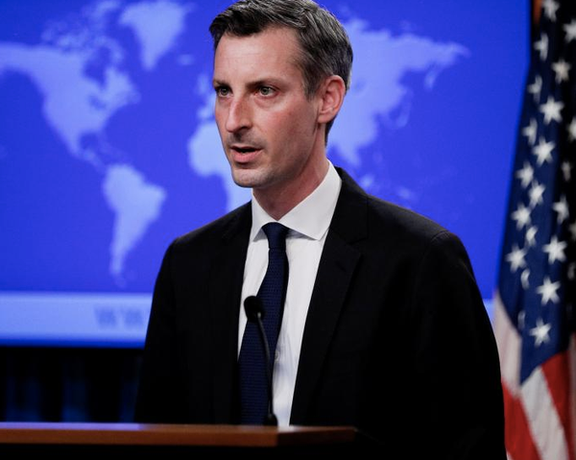
The United States is doing everything possible to counter the “burgeoning” military ties between Iran and Russia, the State Department spokesperson said Monday.

The United States is doing everything possible to counter the “burgeoning” military ties between Iran and Russia, the State Department spokesperson said Monday.
In response to a question by Iran International’s correspondent Samira Gharaei about a report on Monday that Iran has supplied new drones to Russia, Ned Price said that the US has been warning about this expanding “two way” relationship since last year.
Price reiterated that “we are taking action to do everything we can to counter this relationship and to counter the transfer of technology…we have exposed this linkage and we are continuing to galvanize countries around the world to maintain focus on this.”
He went to characterize the alliance between Moscow and Tehran as a “profound threat to the people of Ukraine but also a security relationship that has the potential to be a threat way beyond.”
Asked about Iranian opposition leaders coming together and potentially forming a council to counter the Islamic Republic, Price said the United States cannot make decisions for Iranians but it is eager to listen to both those inside the country and activists in the diaspora, and will continue to hear a wide spectrum of voices.
Price also confirmed that US Special Envoy for Iran Robert Malley was heading a delegation that has arrived in Saudi Arabia to hold discussions with Gulf Cooperation Council countries on air and missile defense, challenges presented by Iran and issues of counter terrorism.
Elsewhere, Price warned about the dangers posed by Iran’s nuclear advances and its export of terrorism, in the context of US Chinese areas of cooperation.

Former head of Iran’s Revolutionary Guard intelligence and advisor to its commander says the “enemy” controls the Internet, so it has to be restricted.
Hossein Ta’eb stated that today "we no longer have aerial bombardments and missiles" and instead a "hybrid war" is taking place.
The clerical regime has blocked thousands of website for the past two decades, but expanded its Internet restrictions at the beginning of antigovernment protests in September.
"The Internet is in control of the enemy, so we have to restrict it to deny the enemy success in its hybrid war," added Taeb.
Islamic Republic officials use the term “enemy” to refer to the United States and its allies.
During a speech at Tehran Polytechnic University (Amirkabir) on Monday, he also attributed support by celebrities for public protests to "hybrid war", claiming that in a hybrid war the fans of a celebrity must get excited to create violence.
Ta’eb also referred to Prince Reza Pahlavi's appreciation for the prominent Sunni cleric Mowlavi Abdolhamid's criticism of the government, saying "we do not have ethnic and religious differences, and Shia and Sunni live together, but some people want to take advantage of this."
He once again accused the US of seeking to create "social rifts" in Iran, so that "both sides in the society will clash first, and then they clash with the government".
He did not say who exactly he meant by the two sides and did not provide any evidence for his claims.
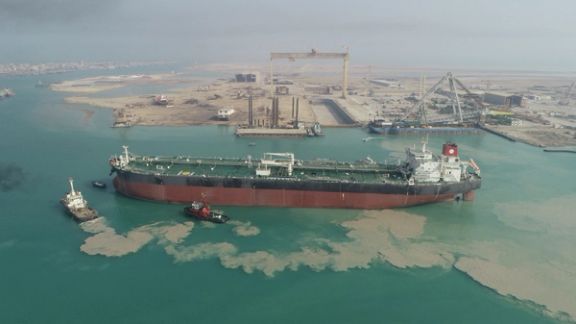
Reuters - Venezuela will contract with an Iranian shipyard to build two oil tankers under an existing agreement, according to people familiar with the matter and documents.
Venezuela's state-run energy firm PDVSA since last year has redoubled efforts to buy and lease oil tankers to rebuild its own fleet. Its maritime operations have suffered from a long-standing lack of capital and U.S. sanctions that have made it difficult to obtain insurance and receive classifications essential to navigate in international waters.
The two new Aframax tankers, to be named India Urquia and India Mara, will cost 31.66 million euros ($33.77 million) each, an internal PDVSA document detailing the proposed agreement showed.
The vessels will be built by Iran Marine Industrial Company (SADRA) at its Bushehr shipyard, which built two previous vessels for PDVSA, the Aframaxes Arita and Anita, that can each carry 500,000-800,000 barrels of oil.
"(Construction of) the India Urquia must start soon," one of the sources said.
REPAID DEBT
The agreement will come after Venezuela settled an outstanding debt to Iran with fuel, according to the document, one of the reasons why the contract has not worked as originally planned.
PDVSA in late 2021 delivered a 644,000-barrel fuel oil cargo to Iran valued at 33.9 million euros.
"The shipyard received 30.34 million euros to settle the outstanding debt for tanker Arita," and another 1.99 million euros went in August to pay accumulated demurrage fees, the document said.
Both the Arita and the second tanker, recently renamed Anita, faced long delays to begin navigating amid the unpaid debts and PDVSA maritime arm's struggles to secure insurance and seaworthy classifications.
The Arita - now renamed Colon - first set sail in 2017 but was later arrested by a vessel operator over unpaid bills. It was returned to PDVSA in 2019 and has mostly remained in Venezuelan waters since.
The Anita departed Iran in late December carrying an Iranian condensate cargo for PDVSA, one of the sources said. It has not yet arrived in Venezuela, according to tanker tracking services.
A separate vessel chartered by Iran's state firm Naftiran Intertrade Company (NICO), the supertanker Wen Yao, also is on its way to Venezuela carrying Iranian condensate as part of an oil swap with PDVSA, monitoring firm TankerTrackers.com said.
By the end of the contract, PDVSA will have paid Iran about 157 million euros for the four vessels, according to the proposal drafted in the document. The deal was first announced in 2006 with much fanfare by Tehran and the government of then-President Hugo Chavez.
Some of the vessels to be handed over by Iran could be operated by third parties, according to one person.
The document did not detail delivery dates for the two tankers to come. PDVSA and SADRA did not reply to requests for comment.
Iran's and Venezuela's oil sectors are under U.S. sanctions that make it difficult to obtain services for vessels built or sailing under those countries' flags, and expose the ships' cargoes to the risk of seizures and retentions.
Washington has in recent years expanded the list of blacklisted tankers linked to Iran and Venezuela, and imposed sanctions on their state oil companies and their maritime arms.
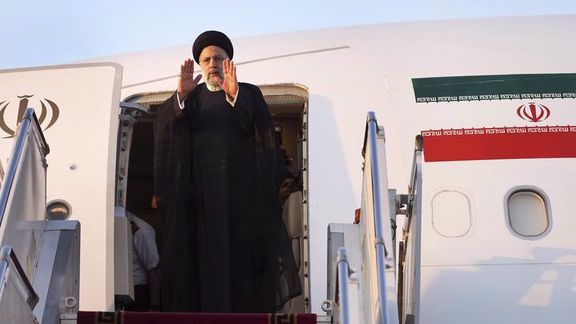
The Iranian president met with the Supreme Leader Monday, a day before his first state visit to China meant to consolidate ties after recent tensions due to Beijing’s close Arab ties.
During a media briefing earlier on Monday, Iran’s Foreign Ministry spokesman Nasser Kanaani highlighted the importance of Ebrahim Raisi’s trip on the development of Tehran-Beijing bilateral ties, saying, “The visit will be made upon an official invitation by the Chinese President Xi Jinping.
“The visit is particularly important from a political perspective. It indicates the existence of a proper political atmosphere in relations and emphasizes the highest political will from the leaders of the two countries to expand bilateral ties based on mutual interests,” he noted.
China’s Xi visited Saudi Arabia in December and also met members of the Gulf Cooperation Council, followed by a joint statement in which the issue of three Iranian islands in the Persian Gulf was mentioned as a claim pursued by the United Arab Emirates.
The Iranian public showed a strong reaction once the joint statement was reported by Persian media, accusing the Islamic Republic authorities of being so weak that its ally China was subtly endorsing the UAE claim.
Kanaani described the deal signed between Iran and China in March 2021 as “a roadmap that outlines the general path and long-term horizon of cooperation between the two countries.” He added that there was a 43-percent growth in Iran-China economic and commercial relations last year, with China being Iran’s first export destination and the second source of imports.
However, there have been other reports in Iranian media saying that trade has declined since mid-2022.
During the meeting with Khamenei, Raisi gave a report on the agenda of the trip and the planned meetings. The readout of the meeting was not released to the media.
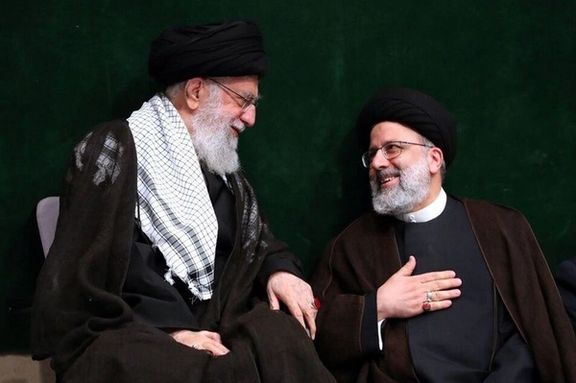
There are reports that Raisi will follow up on the so-called the 25-year comprehensive strategic partnership agreement, which so far has been nothing more than a wish list without a practical implementation plan.
The Islamic Republic is not only facing a strong challenge by dissidents and opponents at home, but also grapples with a serious economic crisis.
In January, a former Iranian ambassador to China said Tehran-Beijing ties are overestimated and only worked as a bargaining chip for China to secure deals with Saudi Arabia. Mohammad-Hossein Malaek, who served as Tehran’s envoy for four years under former president Mohammad Khatami, added that the agreement is a document without any value, especially following the visit by Xi to Saudi Arabia in December, when the two sides agreed “on the need to strengthen cooperation to ensure the peaceful nature of Iran’s nuclear program,” calling on Tehran to cooperate with the International Atomic Energy Agency (IAEA) and to “maintain the non-proliferation regime.”
Raisi himself also penned an op-ed article published in the People’s Daily, the official newspaper of the Central Committee of the Chinese Communist Party (CCP), emphasizing that “As two living and dynamic human civilizations, Iran and China were connected to each other via the historic Silk Road, and ascertained the fact that prosperity and happiness as desirable popular goals can only be achieved through interaction and cooperation.”
About the 25-year agreement, he claimed that the deal was signed to develop mutual cooperation in various fields because both Tehran and Beijing pursue similar approaches vis-à-vis international developments and are opposed to imperialism as well as unilateralism – a clear reference to the United States.
Wang Wenbin, the spokesman of the Chinese Ministry of Foreign Affairs, said Monday that "This is President Raisi's first visit to China in office. During the visit, President Xi Jinping will hold talks with President Raisi to jointly chart the course for and steer the future development of China-Iran relations, and have in-depth exchange of views on regional and international issues of common concern."
He also echoed sentiments similar to those of Raisi about traditional friendship, saying that “To consolidate and develop China-Iran relations are their joint strategic choice.”

“In recent years, under the guidance of President Xi and President Raisi, the China-Iran relations have maintained a sound momentum of development, with political mutual trust consolidated continuously and practical cooperation in various fields making steady progress,” he added.
The Chinese spokesman also talked about the so-called strategic agreement, noting that “Taking this visit as an opportunity, China looks forward to working with Iran to further advance China-Iran comprehensive strategic partnership and playing a constructive role in enhancing unity and cooperation among countries in the Middle East and promoting regional security and stability.”
Iranian state media reported that during Raisi’s three-day visit, mechanisms to make the deal operational will be finalized. In a televised interview Sunday night, the political affairs deputy head of President's Office, Mohammad Jamshidi, said, "We are after establishing broad-scale economic cooperation with China, whose framework is the comprehensive Iran-China cooperation document." “We have advanced the mechanisms for implementing the comprehensive agreement between Iran and China, which was a deal on paper at the beginning of this administration. The agreement’s finalization will be followed up during this trip.”
Many Iranians have expressed resentment over the 25-year cooperation agreement with China and a proposed 20-year deal with Russia, saying it is a sell-out. Although Iran has not revealed the details of the agreement with China and what it will entail in political, economic and military terms, some social media users go as far as claiming that the Islamic Republic is "selling out the country and its people" to China and Russia.
Iran has once and again indicated its intention to rely more on Asian countries, particularly China for trade relations as talks with the United States and Europe to resolve differences over Tehran’s nuclear program have not succeeded so far and US sanctions remain in place. However, Beijing has so far has not seriously challenged US sanctions, as it has cultivated closer ties with the Persian Gulf Arab countries and Israel.
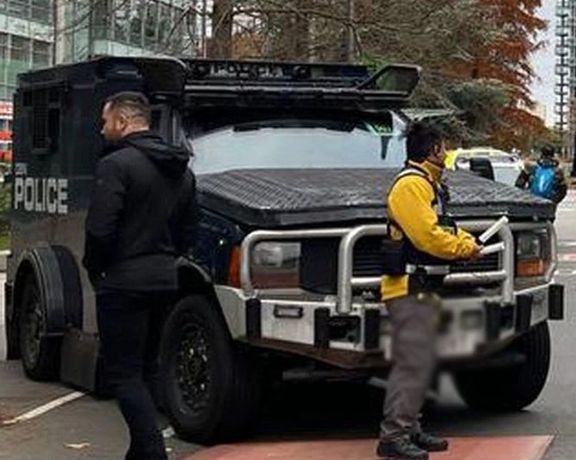
The London police has charged a man with a terrorism offence on Monday after he was arrested two days ago in the vicinity of Iran International’s headquarters.
Magomed-Husejn Dovtaev (Mohammad-Hussein Dovtaev), 30, an Austrian national, was charged with collecting information likely to be useful for committing or preparing an act of terrorism, sources told Iran International.
The suspect's name in Russian spelling signals that he is originally from one of the former Soviet republics, more likely from a Muslim-majority country.
He was arrested at Chiswick Park by officers from the Metropolitan Police Counter Terrorism Command.
Iran International was warned by authorities in November that its journalists were under threat from Iranian agents and the Metropolitan Police took measures to strengthen security around the network’s office in the area.
Dovtaev has been charged with violating Section 58 of the Terrorism Act of 2000. He is due to appear at Westminster Magistrates’ Court on Monday, February 13.
Amid repeated threats by the Islamic Republic against Iran International’s reporters, the UK government vowed in December to step up protection of London-based journalists.
British Foreign Minister James Cleverly said during a session at the parliament on December 13 that the Foreign and Commonwealth Development Office (FCDO), in partnership with the Home Office, had ensured that the Iranian journalists were protected by the British police.
“The UK remains absolutely determined to ensure that Iran does not intimidate people within this country. We will always stand up to the aggression from foreign nations,” he noted, adding, “We will absolutely not tolerate threats, particularly towards journalists who are highlighting what is going on in Iran, or indeed any other individual living in the UK.”
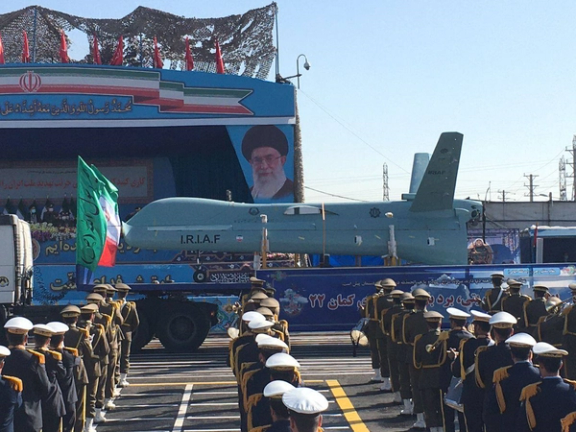
Iran used boats and a state-owned airline to smuggle new types of advanced long-range armed drones to Russia for use in its war on Ukraine, sources in Tehran told the Guardian.
The report saysIran delivered at least 18 of the drones to the Russian navy after officers and technicians made a special visit to Tehran in November.
“On that occasion, the 10-man Russian delegation selected six Mohajer-6 drones, which have a range of around 200km and carry two missiles under each wing, along with 12 Shahed 191 and 129 drones, which also have an air-to-ground strike capability,” added the Guardian.
Unlike Shahed 131 and 136 drones, which have been broadly used by Moscow in kamikaze attacks against Ukrainian infrastructure, the higher-flying drones are able to deliver bombs and return to base.
The disclosures show that the two countries sharing hostility towards Washington are getting closer.
Iran’s Islamic government has supplied hundreds of drones to Russia since mid-2022 that have been used during missile attacks to swarm Ukrainian air defenses.
Increasingly short of missiles to sustain its brutal bombing campaign of Ukraine’s towns and cities, Russia has turned to Iran and also North Korea to replenish its stocks.
The United States and Europe have imposed new sanctions on Tehran for its expanded military ties with Moscow and its deadly crackdown on protests since last September.